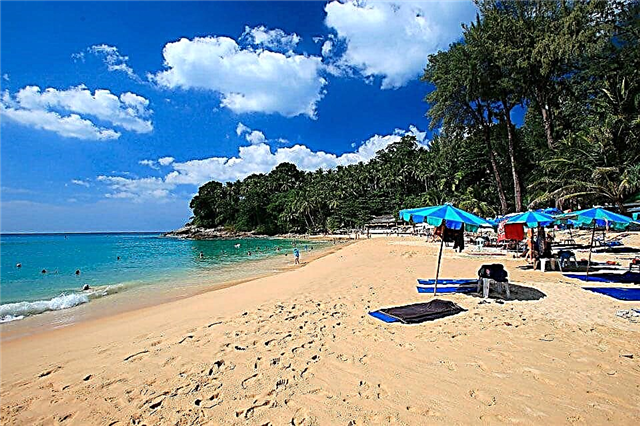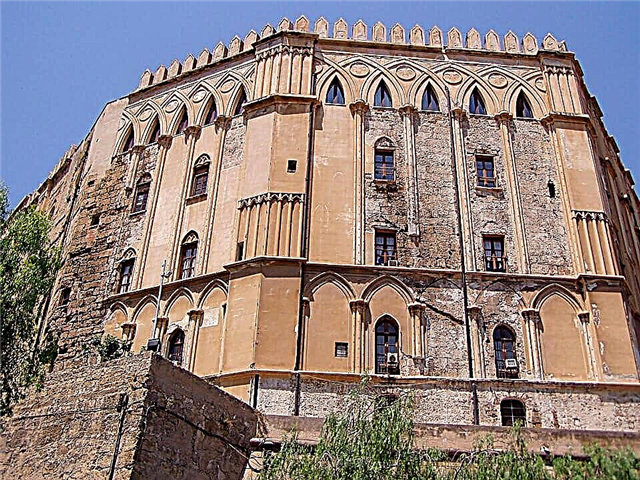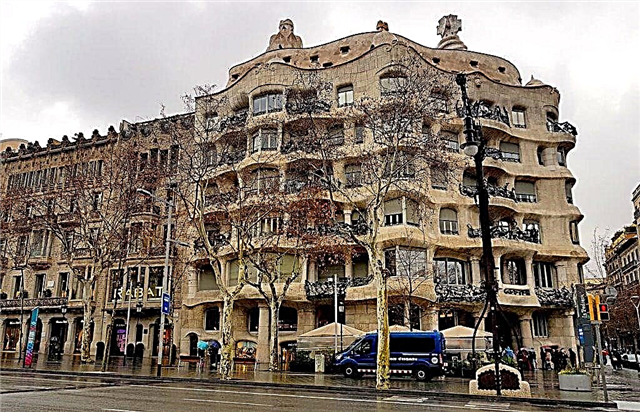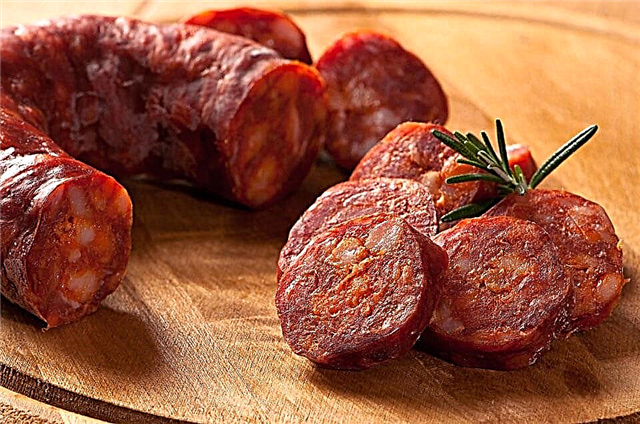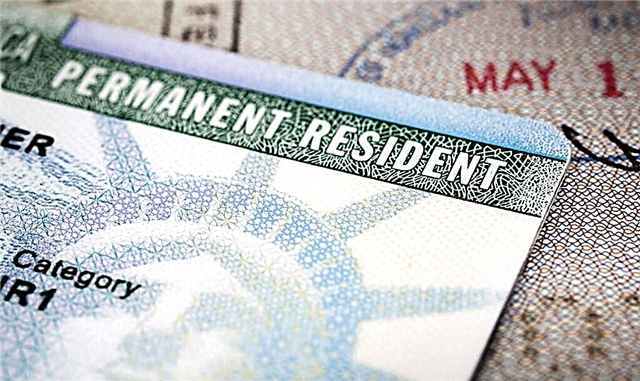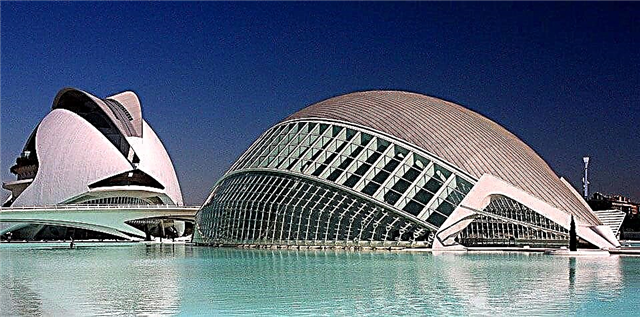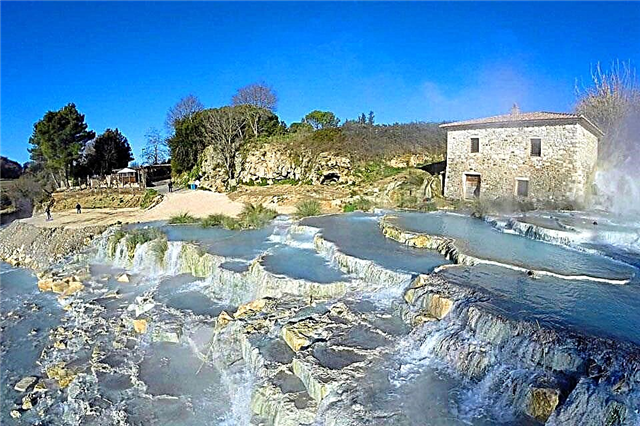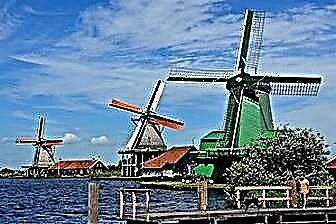The land of blooming tulips and windmills. More than 15 million tourists visit the Netherlands annually, primarily from neighboring countries: Belgium, Germany and Great Britain. Tourism is an important sector of the economy, the most visited city being Amsterdam, the capital of the country. Popular natural attractions include the North Sea coast with long beaches and dunes. One of the country's tourist symbols is the De Wallen district, the famous red-light district. The Netherlands has legalized prostitution and soft drugs.

The best hotels and hotels at affordable prices.
from 500 rubles / day
What to see and where to go in the Netherlands?
The most interesting and beautiful places to visit. Photos and a short description.
Rijksmuseum (Amsterdam)
Art Museum in the historic quarter of Amsterdam. It is one of the 20 most visited museums in the world. The works of Dutch artists form the basis of the collection, but there are also works by famous artists from other countries. There are paintings by Van Dyck, Goya, El Greco. The collection of paintings by Rubens is collected - 20 works. To accommodate one of them, the painting "Night Watch", in 1906 the premises of the museum were rebuilt.

Dam Square (Amsterdam)
A central location in Amsterdam, home to many of the capital's historic buildings and the city's festive and celebratory events. In addition, the square has historically been the center of the city's commercial and political life. The sights of the square are the monument-obelisk in honor of the victims of the war, the Gothic New Church, the Royal Palace, Madame Tussauds with wax figures.

Royal Palace (Amsterdam)
The building of the former town hall, built in 1665, is now in the possession of the monarch. The palace was built in the style of Dutch classicism with elements of Roman architecture. The three-storey building is built of bricks and yellow sandstone. It is crowned with a dome with a weather vane in the shape of a ship. The interior decoration is made of marble. In the Central Hall, the hemispheres of the Earth are depicted on the floor. The galleries of the palace are decorated with paintings by great artists.

Canals of Amsterdam and Utrecht
The canal system of Amsterdam is included in the list of sites protected by UNESCO. The total length of all the canals is several hundred kilometers; about 1,500 bridges have been laid over them. The largest canals are the Herengracht, Singel, Prinsengracht and Keizersgracht. A fascinating boat trip along the city canals can also be made in Utrecht. The main channel, Oudegracht, was built in the 12th century and runs through the historic part of the city.

De Wallen Quarter (Amsterdam)
Popular with tourists red light district. Among the buildings with ancient architecture, tourists are more attracted by lanes with small cabins rented by prostitutes. A glass showcase in such rooms is illuminated with red light. De Wallen has a prostitution museum housed in a former brothel and a marijuana museum. Visiting erotic shows and sex shops is popular among the quarter's visitors.

Vondel park (Amsterdam)
City Park, created in 1865. The 47-hectare park is visited annually by about 10 million people. People come here both just to stroll along the beautifully designed alleys, and for cultural entertainment. There is a cinema museum in the park, where films of different periods are shown - from silent films to modern films. It also hosts lectures and exhibitions. An open-air theater is open in summer.

Keukenhof (Lisse)
The park of flowers, in the center of which is the castle of the same name, built in 1642. It is called both the Royal Park and the Garden of Europe. Occupies an area of 32 hectares. Daffodils, hyacinths and even Japanese sakura grow in the park. But the incredible exhibition of tulips attracts visitors - there are more than 4 million of them in the park. Blooming gardens are located between ponds, streams and canals. Some of them can be navigated by boat.

Freithof Square (Maastricht)
From this place it is better to start your acquaintance with the small town of Maastricht on the border with Belgium. All the main streets of the city lead here, and from here begins the popular excursion tram route through the historic part of the city. Among the historical buildings of the square, the Basilica of St. Servas stands out. A theater with a varied repertoire is located nearby. There are many small cafes and souvenir shops on the square.

Peace Palace (The Hague)
Located in The Hague, the palace building hosts meetings of the UN International Court and the Court of Arbitration. It is built of red brick with light sandstone and combines architecture of different styles from Gothic to Byzantine motives. Surrounded by an English-style park, decorated with a fountain and sculptures. The artworks inside the palace reflect the cultures of different countries - they are donated by states participating in world conferences.

Binnenhof (The Hague)
This architectural ensemble is considered the political center of the country. The government of the country works in the premises of the castle and here in one of the towers the residence of the Prime Minister is located. The castle complex was built in the 13th century; many medieval architectural masterpieces have been preserved in its courtyard. The ensemble is based on Ridderzaal. In it, the monarch makes a speech annually before the opening of parliamentary sessions.

Kinderdijk windmills
A system of windmills was built near the village, located between the confluence of two rivers, in 1740. 19 ancient mills are a popular tourist attraction and are on the list of UNESCO World Heritage Sites. There are mills on both sides of the artificial canal. Bicycles can be rented for walking in the mill park. And in winter, a skating rink is set up on the ice of the frozen canal.

Open Air Museum in Arnhem
The 44-hectare museum-park was founded in 1912. It houses the country's ancient buildings - residential buildings, public buildings and factories. A total of 80 buildings from different time periods. The creation of the museum was aimed at preserving knowledge about ancient traditions and crafts. Reenactors demonstrate the work of linen and paper production, as well as brewing. There is an exhibition of transport, including electric trams.

Zanse Schans (Zaandam)
Another open-air museum, but in the city of Zaandam. It contains samples of Dutch woodwork from the 17th-18th centuries, as well as several windmills. The mills are operational and are used for oil mills, sawmills and mustard production. You can see the production of wooden shoes with your own eyes, and try about 50 varieties of fresh cheese in a cheesemaker. The shops sell products made in the museum.

Castle De Haar (Utrecht)
The largest castle in the country in the style of the national gothic. The fortified tower on this site was built in 1391, but the change of owners, attacks and tornadoes left the castle in ruins by the 19th century. The restoration of the castle took about 20 years. Architect Peter Kuipers not only worked on the walls of the castle, but also added plumbing and heating. The interior decoration is striking in luxury, and a garden with 7000 trees is laid out around the castle.

Utrecht Cathedral
Located in the city center. Once the cathedral was a single ensemble with the Dome tower, but the buildings were separated by a strong tornado that brought down the central nave of the cathedral. The Gothic cathedral was built in the 12th century. Many fragments from the old church have survived to this day. On the territory of the destroyed nave, a square was arranged and trees were planted. Decorated arches and multicolored stained glass windows stand out in the interior.

Cathedral of Saint John ('s-Hertogenbosch)
Founded on the site of a Romanesque church. The construction of the cathedral began in 1220 and ended in 1340.The construction of the 73-meter-high tower was completed only in 1525. The length of the church is 115 meters. Currently, the building of the cathedral is a monument of the country's historical architecture. For a long time, the church was a parish, until in 1559, with the formation of the city diocese, it was given the status of a cathedral.

Van Gogh Museum (Amsterdam)
The Museum of Amsterdam, dedicated to the work of the famous artist, contains almost a quarter of all his canvases - 200 works. In addition to paintings, about 400 of his drawings and about 700 letters are exhibited. Several exhibitions are devoted to the artist's life. The museum also exhibits works by impressionist artists such as Manet and Monet, Gauguin and Signac. There are several sculptures by Rodin and Dalou. More than 1.5 million people visit the museum annually.

Anne Frank House Museum (Amsterdam)
In this house, the girl and her family were hiding from the Nazis in the "Shelter", built to shelter Jews from the Holocaust. For more than two years of her life in the Vault, Anna kept a diary, the publication of which caused a public outcry. This led to the opening of the house museum in 1960. Among the exhibits are the original of Anna's diary, materials about the terror of the Nazis, and a film-biography of the girl's life is shown. More than a million people visit the museum annually.

Rembrandt House Museum (Amsterdam)
An art museum dedicated to the artist's work. Placed in the house where Rembrandt lived for 17 years. It recreates the atmosphere that was here during the artist's life - furniture, room decoration. The museum contains interesting collections of the master's works - engravings and graphic works. One of the main expositions consists of works by Rembrandt's students and teacher, as well as paintings by the artist's contemporaries.

Mauritshuis (The Hague)
Royal Art Gallery. The number of paintings in it is small, but the canvases exhibited in it, one and all, arouse the admiration of the public. These are the works of Rembrandt, Potter, Hals, Vermeer, Sten. In total, about 250 paintings by Dutch artists from the Golden Age have been collected. The gallery is housed in a mansion built in 1641. It is often compared in importance to the Royal Palace.

Frans Hals Museum (Haarlem)
Art Museum, founded in 1862. The core of the collection is made up of works by Hals, but there are many paintings by other local artists in the museum. The museum exhibits works by van Haarlem, the Heemskerk baths, van Scorel and Goltzius. The museum collection also includes ancient religious exhibits related to Roman Catholic art. The museum's exhibitions change frequently due to a lack of exhibition space.

NEMO Museum (Amsterdam)
The museum's expositions are mostly designed for children. It tells about scientific discoveries and facts in a simple and visual form. The exhibitions are divided into floors according to the level of difficulty. On the ground floor, there are mirrors, soap bubbles and other exhibits for primary school age. Above are expositions dedicated to physics and chemistry. On the top floor, the exhibits will be of particular interest to teenagers.

Wouda steam pumping station
The station was built in 1920 in the province of Friesland for flood protection. Queen Wilhelmina came to its opening. The station's design was based on a complex of steam engines and centrifugal pumps. Subsequently, the station's coal-fired boilers were replaced with modern ones, which were eventually converted to oil. The station is operational and is being launched for several days a year. Included in the UNESCO list.

Markthal Market (Rotterdam)
Unique retail and residential complex in Rotterdam. The building is made in the form of a giant arch; shopping areas are located between the residential buildings. There is underground parking. The device of the transparent façade allows you to evaluate the decoration of the arch vaults from the outside. Bright paintings cover the entire ceiling inside - it is 11,000 m². Queen Maxima was present at the opening of the masterpiece of modern architecture.

Cubic Houses (Rotterdam)
The most striking and popular architectural landmark of the city. Avant-garde cube houses are combined into a single residential complex. The houses visually look like cubes placed by edges on a hexagonal pylon. The intricate view of the raised houses attracts many tourists. This is used by the tenants of the apartments, inviting them on excursions to their home. Each cube contains a three-story apartment.

Euromast (Rotterdam)
The tower is 185 meters high. At the same time, the diameter of the amazing structure is only 9 meters. The observation deck of the tower is located at a height of 96 meters. Because of its shape, locals often call the Euromast the "crow's nest". There is a luxury restaurant on the observation deck, and two super luxury hotel rooms are located on the upper level. Visitors overcome part of the ascent in a panoramic cockpit.

Erasmus Bridge (Rotterdam)
It is one of the symbols of the city due to its unusual and recognizable design. It is called the "swan bridge". The cable-stayed bridge was built in 1996. Its length is 802 meters. The height of the pylon is 139 meters. The bridge has a drawbridge. In Western Europe, it is considered one of the heaviest and largest. At night, the original shape of the bridge is beautifully illuminated by lights.

Delta Project
A sophisticated system of structures designed to protect lands in the Rhine Delta from flooding. Within the framework of the project, a complex has been created, consisting of storm barriers, dams and locks. The works were completed in 1997 and the Delta project is considered one of the largest such projects in the world. It includes almost 15,000 dams and about 300 structures. The project was included by American engineers in the modern list of the Seven Wonders of the World.

Port of Rotterdam
One of the largest ports in the world with a large cargo turnover. Most of the cargo is oil products, ore and coal. About 30,000 ships pass through the port annually. The port area is 105 km², the length is 40 km. The first harbors in this place appeared in the Middle Ages, but the main development of the port was already in the XIX century. A visit to this place will be interesting not only for those who are interested in ship business.

Park of miniatures "Madurodam" (The Hague)
It is a miniature copy of the city with typical Dutch buildings, the originals of which are located in different parts of the country. Models are made in 1:25 scale. About 4 km of the railway has been laid along Madurodam. The park is interactive and incredibly real. With the help of a special remote control, you can control barrier dams, loading containers or take off an aircraft.

Efteling Theme Park (Katshevel)
An amusement park with beautiful landscapes and a variety of attractions. Its area is 276 hectares. The theme of the park is fairy tales. In it you can find many heroes of Perrault's favorite fairy tales, the Brothers Grimm, Anderson. It has a golf course and three park-themed hotels. The park has 36 attractions, of which 6 are roller coasters. The number of visitors to the park per year is approximately 5 million.

Amsterdam zoo
Large royal zoo. Opened in 1838. In addition to an extensive collection of animals, the zoo has a planetarium, a large aquarium and a zoological museum. Visitors are interested in the unique museum of microorganisms, which has no analogues in the world. For the animals, there are living areas that correspond to their habitat in the wild. The park is home to centuries-old unusual plants and a lot of greenery.

De Hoge Veluwe
National park located on a large flat area. Founded by private individuals - patrons of Keller. The park is loved by locals and tourists for the opportunity to engage in active recreation in it - walking, cycling, equestrian sports. Mouflons specially brought here live in the park. The landscapes of the park are represented by heather wastelands, coniferous forests and open sands.

Scheveningen beach and pier
The beach is located on the North Sea and is popular with holidaymakers in the summer - the water temperature reaches 23 degrees. The wide sandy area of the beach stretches for several kilometers. The beach is also suitable for surfers. One of the attractions of the beach is the old pier. The multi-level structure offers a picturesque view of the sea and the beach. The landscape is especially beautiful in the rays of the setting sun.

Wadden sea
It is separated from the North Sea by a chain of small Wadden Islands. The Wadden Sea consists of many shallow areas. The unusual coast was formed as a result of natural changes in the X-XIV centuries. At low tide, twice a day, the sea is completely drained and replenished at high tide. The Wadden Sea is included in the UNESCO list, it has a unique flora and fauna, which is home to many migratory birds.


